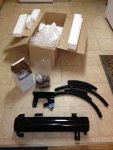driscollies
Seaman Apprentice
- Joined
- Nov 19, 2016
- Messages
- 42
I have a mercruiser stern drive and I'd like to add a freshwater cooling system. Is this doable by an average DIYer? I would guess I'm mechanically decent/average. Do all my maintenance now, comfortable with cars, have rebuilt a few outboard engines, etc. But I also don't understand electrical systems very well and I'm pretty lost when it comes to gears/shifting assemblies and I don't know that I'd feel comfortable hauling out a big sterndrive engine and rebuilding that whole thing. Average mechanic.
I found a freshwater cooling kit online. Is this something that takes alot of know-how to install? Would I have to remove the engine? Or is it more a matter of just hooking up the fresh water to the intakes somehow? What's involved?
Second general question, what advantages will this give me? Will it allow me to run in salt water without worrying as much about engine corrosion, like in the exhaust manifolds and whatnot? Is there any way to run antifreeze through here, so I don't have to drain the block whenever I boat over the winter?
EDIT: I should also probably say, i've never ran this boat in salt water. Just fresh, but I'd like to be able to dabble in salt if I can!
thanks in advance for any and all input
I found a freshwater cooling kit online. Is this something that takes alot of know-how to install? Would I have to remove the engine? Or is it more a matter of just hooking up the fresh water to the intakes somehow? What's involved?
Second general question, what advantages will this give me? Will it allow me to run in salt water without worrying as much about engine corrosion, like in the exhaust manifolds and whatnot? Is there any way to run antifreeze through here, so I don't have to drain the block whenever I boat over the winter?
EDIT: I should also probably say, i've never ran this boat in salt water. Just fresh, but I'd like to be able to dabble in salt if I can!
thanks in advance for any and all input
Last edited:




















